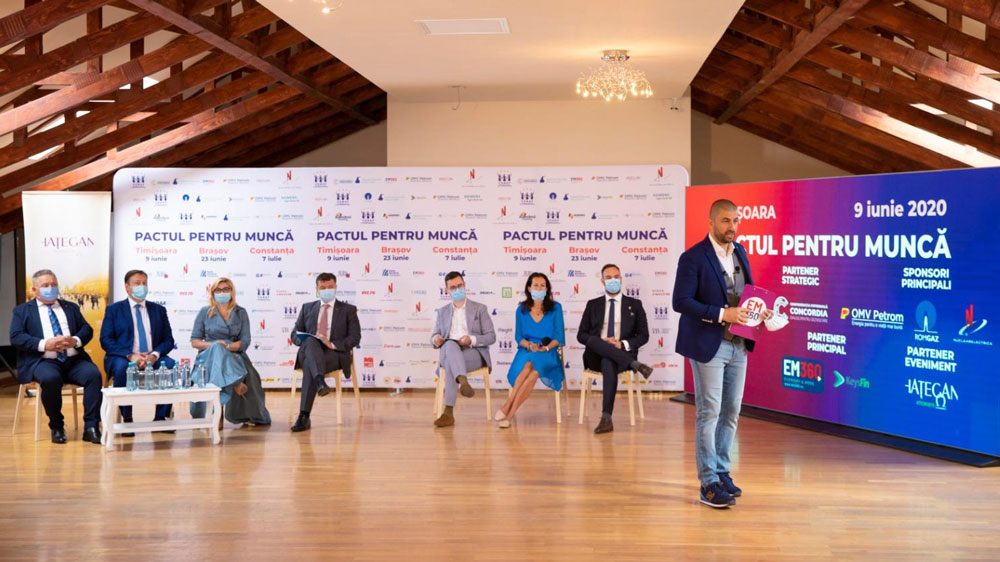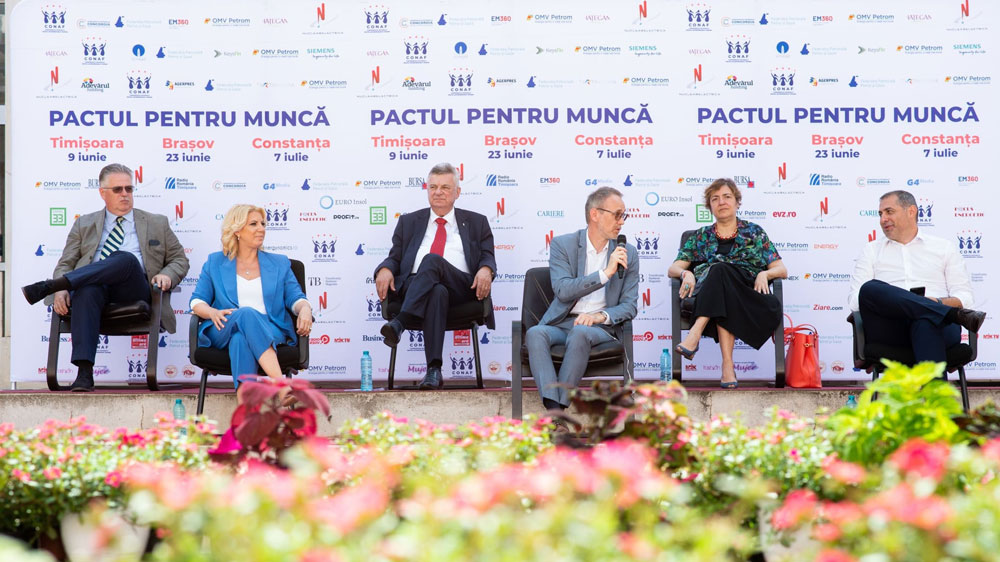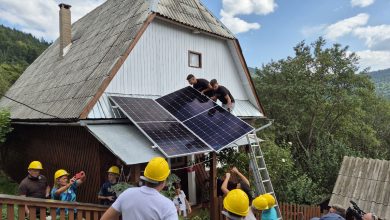Labour Pact – Together We Rebuild Romania – Update
Employers’ Unity, Social and Political Consensus for an Efficient Labour Market
The first debate (in 2020) of the ‘Labour Pact – Together We Rebuild Romania’, an event initiated by CONAF and FPPG in strategic partnership with Concordia, took place in Timisoara. “Romania needs employers’ unity, social and political consensus to prepare a medium and long-term employment strategy,” was the conclusion of this event.
Representatives of employers, local and central public authorities, entrepreneurs and multinational companies debated in Timisoara the problems faced by the labour market in Romania and launched solutions to overcome the current situation.
“We want to work in Romania! We want to learn a trade in Romania!” said Cristina Chiriac, President of the National Confederation for Female Entrepreneurship – CONAF. She added that it was time to become aware of the fact that Romania’s most important resource is represented by people and we have the moral duty to create for them all conditions to increase the quality of life in Romania. “The Labour Pact is a tool through which we invite to dialogue all the main actors, employers, trade unions, government, to determine and build with priority a medium and long-term strategy regarding the employment policy. It is often stated about the entrepreneurial environment that it fails to coagulate and act as a unit even when we have objectives of national interest. But now the Labour Pact is more than a tool, it is an integrator of forces, which can be suggestively be named the Entrepreneurs’ Party,” said Cristina Chiriac.
In turn, Franck Neel, President of the Oil & Gas Employers’ Federation – FPPG, showed that, although at government level measures had been taken for the post-pandemic economic recovery, much more measures are needed to help Romania’s economy. “Investments are required, the only ones able to create new jobs. But, for that, legislative changes are required. And they are needed now! An example in this regard is Black Sea gas. Investments in this sector not only do they have the advantage of ensuring the country’s energy security, but also of creating tens of thousands of new jobs, directly and horizontally,” Franck Neel also said.
Secretary of State in the Ministry of Transport, Infrastructure and Communications Dragos Cosmin Lucian Preda announced that government authorities, together with representatives of the entrepreneurial environment, wanted to compile a list of opportunities in Romania. According to him, the pandemic gave Romania the chance to restart, to implement new technologies, digitization, 5G etc. “Probably a list of new trades will also be required, with the apparition of new technologies,” Dragos Cosmin Lucian Preda also said.
Investment in education – Chance for Romania’s future
Within the Labour Pact debate in Brasov, organized by CONAF and FPPG, having as strategic partner CONCORDIA Employers’ Confederation, the representatives of employers, trade unions, academia, entrepreneurs, together with officials of local and central public authorities, as well as representatives of Romania in relation to the EU and UN, have concluded that the problems faced by the labour market in our country include education inadequate to the requirements of the real economy. Obviously, the need to develop the road, digital and health infrastructure and the need to amend the Labour Code to make the labour market flexible in the current context of digital development at global level, as well as cutting red tape are also necessary for a sustainable development of a long-term strategy of the labour market.
“The most vulnerable, but also the most important resource of the country is represented by people. We need to value them and we need to create a medium and long-term workforce strategy for them. We need to have qualified workforce, we need investments in all priority fields, from infrastructure to education and health, and we need to focus on the development of human skills to meet future challenges. Future can no longer be built in small steps. Children who go to school today will probably retire within 50 years, so we need a systematic thinking, with vision and anticipation of the crafts of the future, so that the adjustment of Romanian education follows the European trends of digital development and emancipation of society over time,” said Cristina Chiriac, President of CONAF.
Steven van Groningen, President of CONCORDIA Employers’ Confederation, is very confident in Romania’s potential: “First of all, we need confidence, because this is the only way to attract investments. Confidence also means predictability. Before the pandemic we had a significant deficit of the workforce. The ‘new normal’ after the pandemic could also bring a deficit of skills, if we fail to make sure we have trained people to work in a world transformed by digitization and automation. Therefore, we need to invest even more in training people and creating new skills,” Steven van Groningen also said.
Franck Neel reiterated the importance of investments, as they create new jobs and keep the existing ones. “An example in this regard is Black Sea gas. The effect of developing offshore projects would spread in the related sectors (transmission and distribution of natural gas), as well as in other industries (chemical and petrochemical industry and gas-fired power production), where new investments of almost USD 9 billion would be possible. In turn, these investments would lead to the establishment and maintenance of around 42,000 jobs, a total estimated impact of over USD 18 billion on revenues to the state budget and a total surplus of almost USD 100 billion in national production of goods and services.”
Luminita Teodora Odobescu, Romania’s Permanent Representative to the European Union, has extensively presented the plans of the European Commission for the economic relaunch of the Union after the global coronavirus epidemic. According to these plans, Romania will be able to access several billion euros to protect jobs.
The debate in Brasov was also attended by Government official – honorary adviser to Prime Minister Ludovic Orban, lawyer Remus Borza. He presented the evolution of the Romanian economy in time and pointed out the need to capitalize Romanian companies and the importance of banks’ support for these companies. A functional economy is built based on a solid banking system, willing to finance the economic players. He supported the idea of the need for youth education, so that they are able to adapt on the go to the new trends in the economy.
The project that could radically change the labour market in Romania
Romania needs a solid restart, structural reforms that are coherent and with vision, claim the representatives of the business environment present at the debates organized during the two years in the major university centres in the country, such as Iasi, Cluj-Napoca, Bucharest, Timisoara, Brasov, Constanta.
Increasing the quality of life, employer unity, social and political consensus for an efficient labour market, correlating the education system with the needs of the labour market, predictable and favourable legislation for new investments to create new jobs, high-performance education adapted to real needs of the economy, the need for infrastructure and elimination of bureaucracy through digitalization, investments in all priority areas (infrastructure, education, health), reintroduction of protected units – are the main priorities of the reconstruction of the Romanian economy, solutions offered and discussed during the debates by almost two hundred entrepreneurs, managers of the major national and multinational companies, academia, trade unions, civil society, specialists in labour and taxation legislation, education, economy etc.
Protecting the human resource should be the main priority of any Government, says Cristina Chiriac, President of CONAF.
“Through the process of privatization of the major state-owned companies, over time, over one million jobs have been lost. Added to these are the social effects of the recent period, over one million jobs endangered and a decline in the school population since the ‘90s to date of over 1,500,000 students, according to INS data, and thus a picture is outlined that highlights the social and economic vulnerabilities of Romania: labour migration, declining birth rate and poor correlation of the education system with the needs of the Romanian economy! Therefore, there is an urgent need for urgent measures to close the gap: between generations, regions of the country, rural and urban areas and, last but not least, between academia and the professional environment. We need to work together with all decision-makers on a medium-term strategy including the measures identified by the entrepreneurial environment through the Labour Pact conferences, so that together we contribute to a viable economic framework for a high standard of living, a declining unemployment rate, well-paid jobs and, of course, a new fiscal policy adaptable to current economic realities.”
Peter Rudolf Zeilinger, representative of FPPG, proposes a number of punctual measures: “We need to be aware that we are going through an economic crisis, caused by the health crisis. The period of state of emergency showed us how important digitization is. Even more so do we need digitization, to increase the competitiveness of Romanian economy. As representative of the oil and gas industry, I can say that offshore operations must be digitized, but it is even more important to digitize onshore operations! We refer to technologies such as ‘Cloud’, ‘Big Data’, ‘Cloud Computing’ etc. By limiting access to digitization for companies and authorities in the oil industry, they are disadvantaged in the competition for capital against other industries in the region or the global market. The need to use advanced information technology tools is even more pressing in the case of Romania, which has mature fields in operation, with a significant natural decline of production. Also, most suppliers of industry-specific solutions provide solutions only in Cloud, the current solutions, installed locally, following to no longer be subject to maintenance or present in the offer for services. However, this can only be achieved by updating the legislative framework to technological progress.”
Ludovic Orban, Romania’s Prime Minister, presented during the conference some of the measures that the Government is preparing: “Although legislation provides for consultations, there haven’t been real consultations and debates between the business environment and the academic or administrative environments. For example, consultations between the business community and local authorities are needed to establish the tuition figure, but these have been rather formal. We support any form of dialogue and partnership between the private environment and educational institutions, for example with regard to the dual system. Let’s not forget that we have a proverb – A handful of trade is a handful of gold; that’s why I think that every person should earn a decent income. We also support lifelong learning mechanisms: training, retraining etc. In the Community budget 2021 – 2027 there are important funds and tools for companies, precisely to ensure this system of lifelong learning and adaptation to the new requirements of the labour market. Let’s not forget that the world has a dynamic evolution, crafts disappear, new ones appear. We need to adapt the education system to the new requirements; we need to connect the education system to the demands of the labour market.”
Dragos Pislaru – Member of the European Parliament, referred to some of the problems faced by Romanian economy. “From July 1, the new skills agenda came into force. There are three major problems we face: qualitative (related to skills), quantitative (related to birth, but also emigration) and territorial (labour market is not homogeneous; in one area there is a labour shortage, and in another – surplus). These three problems must be solved, through the involvement of all actors.”
“Before the shock of COVID-19, the Romanian emigrants of working age exceeded 2.6 million people, representing almost 20% of the working age population in Romania. The World Bank’s estimates were made on the basis of Eurostat data, but also on the basis of national censuses in the destination countries,” said Andrei Silviu Dospinescu, economist in the Romanian office of the World Bank. Romania ranks 52nd out of 140 in the Global Competitiveness Ranking compiled by the World Economic Forum and records one of the lowest scores in the 2020 European Competitiveness Ranking. This is due to a sharp demographic decline, in particular a decline in the active population, a high emigration rate, including highly skilled labour, and a labour market participation rate of 67% (compared to the EU average of 74%).
According to World Bank data from recent years, among Romanians with higher education, perhaps the worst situation is among doctors – over 50% of emigrants who are doctors and working abroad, are under 40 and, in addition, a very large number thereof are resident doctors.
At the end of two years of Labour Pact debates, the conclusions and solutions found during the discussions will materialize in an agreement – Memorandum of Understanding – agreed by the participants in conferences. The document will be submitted to the Romanian Government and Parliament and include the main solutions identified for a flexible, efficient and competitive labour market, with beneficial effects on the entire economy, as well as on the standard of living of Romanians.
The debates took place in large university centres, because a correlation of labour market needs with the education system is a first step to have an effective workforce strategy.








